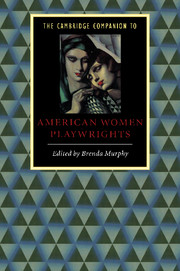3 - Realism and feminism in the Progressive Era
from Part 1 - Pioneers
Published online by Cambridge University Press: 28 May 2006
Summary
It has become a commonplace in recent feminist theory to dismiss stage realism as fundamentally incompatible with feminist interests. The reasons for this dismissal have changed through time. In the 1970s some feminists rejected realism simply because they saw its linear form as designed to reflect male experience exclusively. More recently, others have denounced realism because it apparently normalizes the traditionally unequal power relations between genders and classes. Still others have charged that realism reinscribes this inequality in a particularly dangerous way by pretending to be an objective recording of the world while representing woman as sexual “Other” and excluding female subjectivity.
While it is certainly true that stage realism has often been guilty of these offenses, I fear that the dismissal of realism by feminists might have several undesirable effects. First, abandoning stage realism means abandoning much important theatre history, especially in America, and especially the works of early twentieth-century feminist playwrights who used realism to illustrate the entrapment of women characters in traditional roles. Second, the outright rejection of realism ignores the built-in subversive possibilities of this endlessly adaptable form. Finally, since realism is still the most prominent mainstream dramatic form in American theatre, rejecting it as a vehicle for feminist issues would deprive feminist playwrights of a widespread audience.
American women realists of one period did, in fact, employ realism as a means to express feminist views. This chapter focuses on three playwrights of the Progressive Era - the first few decades of the twentieth century - because it was a time of widespread changes in the position of women as they fought for the rights to vote, to become educated, to support themselves, and to live independent lives. The plays of Zona Gale, Rachel Crothers, and Marion Craig Wentworth will demonstrate how realism could once - and possibly still can - be used to promote positive social change for women.
- Type
- Chapter
- Information
- The Cambridge Companion to American Women Playwrights , pp. 31 - 46Publisher: Cambridge University PressPrint publication year: 1999



